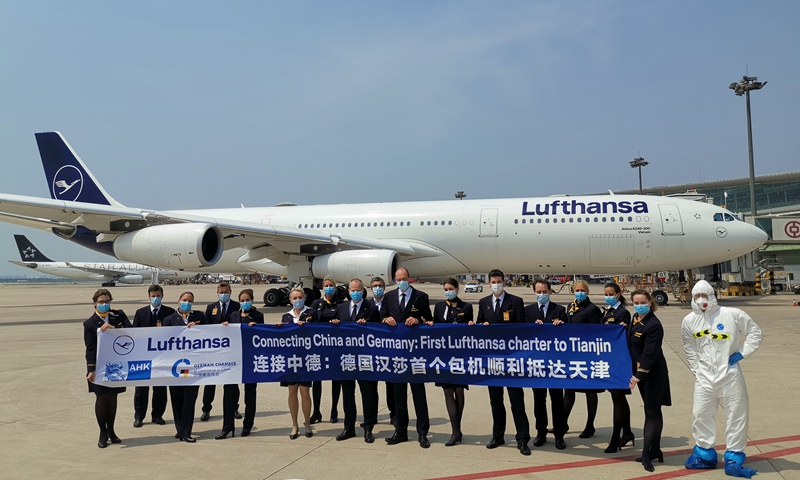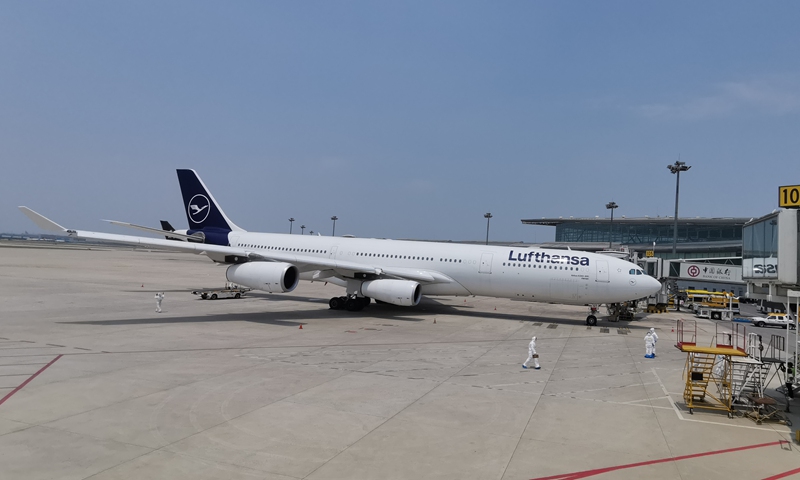200 German businessmen return to China on first repatriation flight from Europe
Source:Global Times Published: 2020/5/30 17:44:05

A flight carrying German business travelers from Frankfurt, jointly arranged by German Chamber of Commerce in China, German diplomatic missions, and Lufthansa airlines, landed in Tianjin at 11:45 am on Saturday. Photo: Courtesy of Lufthansa Group
The first group of about 200 German managers, workers, and family members landed in North China's Tianjin on Saturday noon. They returned to China on the first repatriation flight of foreign nationals from Europe, after China contained the coronavirus outbreak amid a gradual resumption of economic activities.
The flight that took off from Frankfurt was jointly arranged by the German Chamber of Commerce in China, German diplomatic missions in China, and Lufthansa airlines. It landed in Tianjin at 11:45 am on Saturday, Lufthansa confirmed with the Global Times, adding that another chartered repatriation flight with some 200 business travelers is scheduled to arrive in Shanghai on Thursday.
"This is an important step to reconnect China's and Germany's economies," said Jens Hildebrandt, executive director of the German Chamber of Commerce in North China, according to a statement Lufthansa sent to the Global Times.
"It is our common interest to contribute in helping the economy return to normalcy and pre-virus levels," Hildebrandt noted.
Currently, more than 5,000 German companies are seeking growth in China, and their executives and key employees urgently need to resume work in the world's second-largest economy.
In an interview with the Global Times in mid-May, Hildebrandt noted that among the German people who are eager to return to China include specialists and machine maintenance technicians, as well as employees' families. Many families have already been separated for more than three months, he said.

A flight carrying German business travelers from Frankfurt, jointly arranged by German Chamber of Commerce in China, German diplomatic missions, and Lufthansa airlines, landed in Tianjin at 11:45 am on Saturday. Photo: Courtesy of Lufthansa Group
Due to the rapid spread of COVID-19 across the world, China on March 28 temporarily prohibited the entry of most foreign nationals.
As the country has brought the coronavirus under control, starting from May, China decided to facilitate some South Korean business travel by establishing a "fast track" entry system.
South Korean companies, such as SK Innovation, SK Hynix and Hyundai Motor, lauded the China-South Korea "fast-track" entry system and deemed it crucial for the return of key employees to resume work in China.
The implementation of the fast track between China and South Korea has facilitated urgent personnel exchanges to resume work and production, and played a positive role in developing bilateral economic and trade cooperation as well as maintaining the stability and openness of industrial and supply chains, Hyundai Motor told the Global Times.
Based on the agreement between the two countries, at present, business personnel from South Korea can visit 10 Chinese provinces and cities after health and coronavirus tests, chinanews.com reported. Travelers' 14-day COVID-19 quarantine will be shortened to one or two days.
As China is yet to extend its "fast track" access to include Germany, some 400 German returnees will have to undergo a two-week quarantine in Tianjin and Shanghai, after furnishing proof of a negative COVID-19 test result with a validity of two days before boarding the plane, the Wall Street Journal reported.
Business personnel from Japan said they are equally eager to resume work in China.
Takehiko Saeki, chief representative of the Japan External Trade Organization's Wuhan office told the Global Times that Japanese companies in China very much hope that a similar channel could be opened between China and Japan to facilitate the return of the heads of Japanese companies to China.
Global Times
Posted in: INDUSTRIES,COMPANIES,BIZ FOCUS